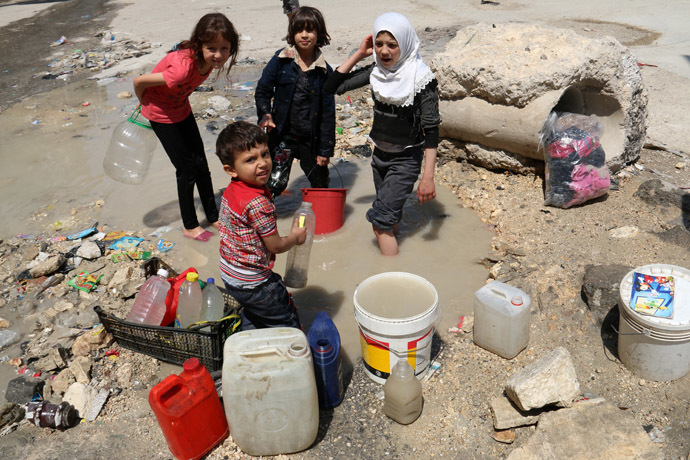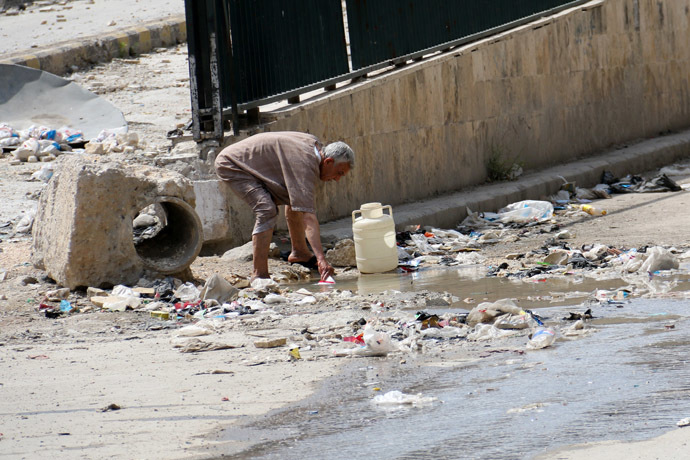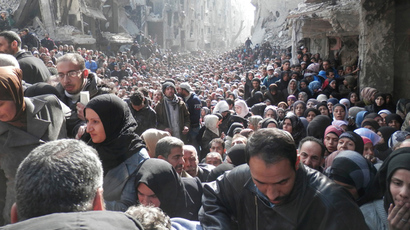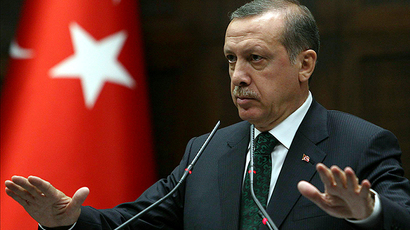Syria’s Aleppo faces deadly water shortage after rebels block supply

Islamist militants from Syria’s opposition have cut off the water supply to most parts of the city of Aleppo by targeting pumping stations. The city has now been plunged into abject misery, as the government and NGOs race to find alternative sources.
More than two million people have been affected by the resulting water shortage after two pumping stations were shut down. Water has stopped flowing not only into government-held areas, as intended, but into practically every corner of Syria’s largest city, which is presently divided in two spheres of control.
Fighters of the Al-Nusra Front and related groups were interested in keeping the water flowing to east Aleppo and prevent it from flowing into the western parts, AFP reports. But the plan backfired, and now tons of water have been squandered irretrievably in the Quqayq river.
Both government media, and the pro-opposition Syrian Observatory for Human Rights are condemning the act and trading blame. The rebels say it was, in fact, a campaign by President Bashar Assad’s forces to bomb the water pumps. The Al-Nusra Front made no statements following the incident.
The misery is spreading, report various journalists on the scene.
In recent pictures from Aleppo, children can be seen scooping up water from puddles along the city’s roads, as others make use of jerry cans and various containers.

The residents queue up with all manner of receptacles in front of places like mosques, wells and ancient fountains, where the water isn’t safe for consumption, Lebanon’s Al-Akhbar daily says.
Residents have been without water for over ten days now. This comes as just last month the Al-Nusra Front targeted the electrical grid distributing power to Syria’s second city and its surroundings.
The situation in western Aleppo seems somewhat more stable, with the Red Crescent working with the government to provide a modicum of water for people.
“The situation signals a humanitarian and health disaster, but we are doing what we can to avert this risk,” a source in the Syrian Red Crescent told Al-Akhbar.
The source added it is only a temporary solution, as the water
provided is not of the best quality for drinking. And the overall
picture is unsanitary, as trucks normally used for waste-water
disposal can be seen ferrying water around the city.
Locals have been digging wells themselves just to alleviate some
of the stress on government and aid organizations, the Syrian
Observatory for Human Rights said.

The latest news was that activists on Tuesday reported a slight reappearance of water pressure in one of the pumps. The cause of this is as yet unknown.
Aleppo has now become a key battleground once again, after the Al-Nusra Front and related gangs lost control of Homs to the Syrian army last week, and 1,200 of them escaped the fighting in a number of buses. Currently, the only area in Syria still more or less under terrorist control is to the northwest of the old battleground of Homs. But that appears to be a temporary situation, as government forces are moving in from different sides.
Before the northern city lost its water, the Syrian Red Crescent had to coordinate between the government and the rebels in sharing what water was available. The pumping station had been dependent on diesel fuel, which the government had agreed to provide in April in exchange for the insurgents turning the electricity back on. It remains unclear what caused the latest targeting of the water pumps, and whether that signaled the end of the precarious deal between the two sides.













